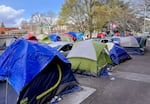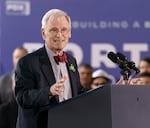
Tents line both sides of Southwest 13th Avenue in Portland, April 4, 2022. The city's growing homeless crisis has become the major issue for many voters this year.
Kristyna Wentz-Graff / OPB
U.S. Rep. Earl Blumenauer has made a life’s work out of promoting and defending his hometown.
In 2009, when conservative columnist George Will disparaged progressive Portland as out of touch with the rest of the country, Blumenauer punched back on the House floor. He offered to fly Will out to the Rose City for a debate and a glass of pinot.
Eleven years later, as nightly protests over police violence gave way to destructive acts and no end of negative attention, Blumenauer appeared on C-SPAN to contest the notion that Portland was a “city in chaos” and to rail against federal forces for stirring up trouble.
Now coasting toward a 14th term in the U.S. House, the bicycle-crazy Democratic statesman is about to experience a political pinnacle. A bike and pedestrian bridge named in his honor will open in Northeast Portland this summer
Related: Election 2022: OPB Ballot Guide
But lately, Blumenauer isn’t bragging quite so loudly about the Rose City.
“Portland is broken,” he said in a statement in February announcing his reelection bid.
That’s a sentiment voters are used to hearing from Republicans during election season. It was a striking comment for Blumenauer, a former city commissioner who, over a decade working in City Hall, helped make Portland a national model for its policies on land use and transportation (think bikes and light rail).
One thing the statement was not: flippant. In a recent phone call, Blumenauer laid out his reasoning.
“We haven’t done everything right, but anybody who watched the trajectory of Portland, I think, realized that we earned a reputation as a community that was growing and thriving and was a magnet,” he said, speaking of the city’s recent history.
Now, though, Blumenauer bikes through the city and sees piles of garbage and people unable to cope with their afflictions. He hears about sharply rising gun violence. His car’s catalytic converter, like many others, was ripped out by thieves.
It’s not that people aren’t still working to make a better Portland, Blumenauer says, but “collectively I am concerned. Collectively it feels like it’s broken. Collectively it seems like we have challenges unlike any we have ever faced.”
Portland agrees.

Congressman Earl Blumenauer, a Democrat, has been a staunch defender of Portland for decades. Lately, he says, the city feels "broken."
Kristyna Wentz-Graff / OPB
Polling from DHM Research shows that voters are far less happy with the city’s trajectory today than at any time in the last 30 years, when the firm began asking. A rock-bottom 8% of voters say Portland is headed in the right direction, down from 38% before the pandemic, and percentages that routinely hit the high 50s and mid 60s earlier this century.
Separate research by the Oregon Values and Beliefs Center has also turned up deep pessimism: 82% of Multnomah County residents surveyed in April reported being either somewhat or very worried about the future of their part of the state.
“I’ve been on the scene since ‘77,” said Adam Davis, a pollster and executive director of the organization. “I’ve never seen anything like this. Seriously.”
The dour mood poses an interesting question in an election year that – nationally at least – appears to be headed in Republicans’ direction: What happens when residents of the state’s most fervently Democratic city decide, like Blumenauer, that something is urgently wrong?
It’s a question political consultants and candidates alike have been wrestling with ahead of the May 17 primary, with few surefire takeaways. While plenty of other cities are experiencing similar crises, political observers in both parties told OPB that the electoral environment this year feels uncertain and that Portland’s woes pose a potentially major challenge for candidates closely associated with the city.
“It’s qualitatively different from any election I can think of,” said John Horvick, senior vice president at DHM Research. “Portlanders are mad at Portland. ... I feel like people are really late to understand how that dynamic is different. "
Finding fault in political leaders
Given all this, it’s no surprise some of the very candidates who would have heralded Portland’s successes in rosier times have distanced themselves from the city this year.
Tina Kotek, the former House speaker from North Portland and a leading Democratic candidate for governor, has been criticized by opponents as complicit in the homelessness crisis within her city – something she forcefully denies.
A recent ad from State Treasurer Tobias Read, Kotek’s main opponent in the Democratic primary, told voters Kotek had spent her time atop the House “overseeing a homeless crisis, surging crime and struggling schools.”
Kotek, though, has put the blame elsewhere. At a recent debate, she lit into Portland leadership when homelessness came up.
“I’m not happy with Mayor [Ted] Wheeler’s performance,” she said. “I’ve worked specifically to say, ‘Here’s money for an RV park.’ Where is it? When I said ‘You need $2 million to clean up trash and graffiti on [the Oregon Department of Transportation’s] property,’ it was there. I don’t believe the city is focused in the way that they should. ... And as governor, we’re going to have some different conversations about ways to make that happen.”
Wheeler’s office did not respond when asked repeatedly for comment on Kotek’s remarks.
Even candidates with a more direct say in the city’s policies have sounded dire at times.
City Commissioner Jo Ann Hardesty, in the middle of a tough reelection fight against opponents blaming her for Portland’s woes, told supporters in a March 25 fundraising email that Portland is “persevering as a community through one of the most terrible periods in our city’s history. I am heartbroken by the suffering on our streets and the struggles of hardworking families.”
Hardesty and every other member of the Portland City Council have endorsed changes to the city charter that could fundamentally alter the city’s increasingly rare form of government, in which commissioners are elected city-wide and get individual oversight of a portfolio of city agencies.
That commission form of governance has been targeted by reformers for decades but has increasingly become a focus of blame for what critical observers in both parties say is a mystifying inability to handle the challenges of the COVID-19 era. In his State of the City speech last week, Wheeler signaled hope that voters in November would “do away with our current, systemically bigoted, red-tape ridden, antiquated form of city government.”
It’s not just city officials calling for those changes. As Willamette Week reported, Metro Council President Lynn Peterson, also seeking reelection this year, recently suggested Portland government is so broken that Wheeler should make unilateral changes via an emergency order.
The difference this year: Democrats have joined the critics
Portland has long been used as a prop in Oregon elections. Republicans hoping to regain a measure of authority in the state reliably use the city as a phantasm to excite their base, warning that the liberal bastion is on the verge of exporting its policy ideas, or its protests, or its homeless.
That hasn’t changed. Republican candidates this year have wasted no time using Portland homeless camps in photo-ops and advertisements, and decrying what they say has been the city’s lax response to a spike in violent crime.
But now, Democrats are just as sour on the state’s largest city.
In the recent poll by the Oregon Values and Beliefs Center, Multnomah County residents of all political stripes reported deep concerns. Of Democrats, 78% said they were somewhat or very worried about the future of the area, compared with 85% of Republicans and 88% of voters in another party or no political party at all. Similar breakdowns exist for survey participants who described themselves as liberal, moderate or conservative on economic and social issues.
“There’s no difference,” Davis, the pollster, said. “Everyone is feeling it, and they’re just feeling like no progress is being made.”
For Davis, the discontent presents reason for concern. He believes that voters who are upset about the state of the city – particularly its homelessness problem, but also crime, trash and government itself – could vote emotionally, and possibly against their best interests.
“You’re seeing people more frustrated than ever before with how things are going at all levels of government,” he said. “Along with that anger is also a great deal of unawareness and low knowledge about government and who’s responsible.” The danger, Davis said, is that voters “throw out an incumbent, and the replacement is really not in any better position to effect change than the person they defeated.”
Portland’s tribulations could also ripple out into its suburbs, where Democratic candidates for statewide office have been able to count on robust support in recent years. If suburban voters are tired enough of what they see as poor stewardship by Democrats, Horvick believes that math could change.
“Washington County, Clackamas County – they’re looking at Portland with real trepidation,” he said. “Democrats have been so successful the last couple decades because they’ve flipped Washington County, in particular, from being a purple county to a deep blue county. There’s real vulnerability there.”
How voter sentiment actually translates at the ballot box won’t be firmly understood until November’s general election, when Republicans are hopeful they can win control of the governor’s office for the first time in decades and believe they can dig out of superminority status in the Legislature.
Related: Oregon GOP gubernatorial candidates hope 2022 puts an end to 40-year losing streak
Just as unclear is how Portland will dig out of its present funk.
“Virtually no politician should be sanguine about this, whether their election is at risk or not,” Blumenauer said. “We’re all talking about the ability to get the job done.”
Lately, the longtime congressman said he’s been revisiting the city’s “greatest hits,” steps like the 1974 decision to kill plans for a freeway through Southeast Portland and instead build light rail, to construct an aerial tram to Oregon Health and Science University, or to festoon the city with bike boulevards.
“Who was involved in that? How did we do it?” Bluemenauer said. “There’s been kind of a spark that’s been missing.”
Blumenauer, facing no serious opposition in a district that is heavily Democratic, is practically assured another two years in office. He insists he’s seeking that extra time, not because he’s pessimistic, but because he believes there is a way to rekindle his hometown’s spark – as long as its leaders are willing to be real about the challenges.
“That’s the only way we’ll get through it,” Blumenauer said. “Don’t sugarcoat it.”
